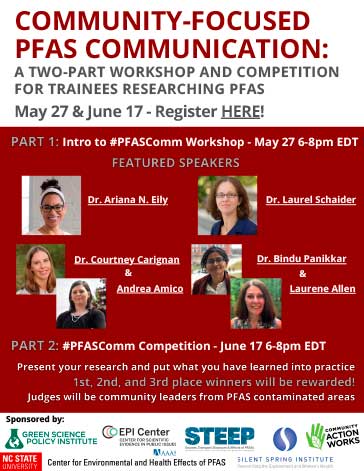 Trainees interested in improving their science communication and community engagement skills were invited to join the PFAS communication training and competition. Open to Postdoc and Graduate students researching PFAS, this event helped to build skills needed to communicate with communities directly impacted by PFAS contamination and share complex PFAS science with non-scientists. Participation in the May 27th training is required to take part in the competition. Register now!
Trainees interested in improving their science communication and community engagement skills were invited to join the PFAS communication training and competition. Open to Postdoc and Graduate students researching PFAS, this event helped to build skills needed to communicate with communities directly impacted by PFAS contamination and share complex PFAS science with non-scientists. Participation in the May 27th training is required to take part in the competition. Register now!
Part 1: Took place on May 27th, 6-8pm EDT as a training webinar on PFAS science communication to PFAS impacted communities. This webinar featured two speakers on science communication, Dr. Ariana N. Eily and Dr. Laurel Schaider, and two case studies on PFAS science communication between PFAS scientists and community organizers, Laurene Allen, Andrea Amico, Dr. Courtney Carignan, and Dr. Bindu Panikkar. Trainees came away with concrete skills and insights to inform future communications with community audiences and examples of best practices for building researcher-community partnerships.
Part 2: After honing their skills in PFAS science communication in Part 1, on June 17th, 6-8pm EDT, will participate in or observe the elevator pitch style competition, where preselected trainees researching PFAS will have the opportunity to present their research to PFAS-impacted community members. 1st, 2nd, and 3rd place speakers will be rewarded.
This event grew out of a workshop organized by the Green Science Policy Institute and reflects an interest in opportunities to improve communication skills for scientists working with impacted communities. Sponsors and organizers: NC State Center for Environmental and Health Effects of PFAS, Silent Spring Institute, Green Science Policy Institute, Community Action Works, American Association for the Advancement of Science, University of Rhode Island STEEP Superfund Research Center.

